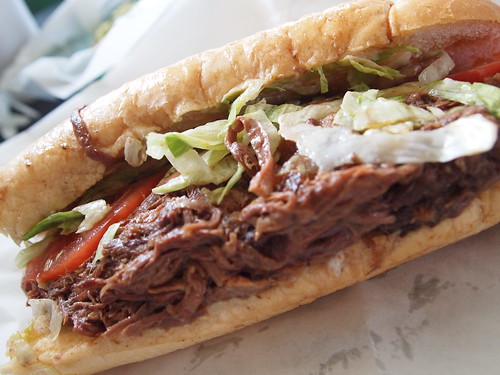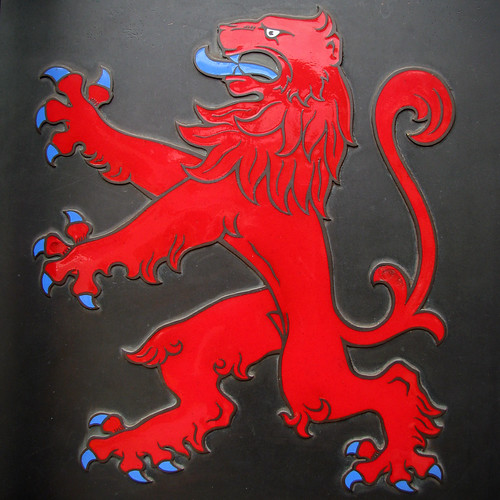Every week we watch tons of TV for weird and interesting words so you don’t have to. Check out our latest selections.
cooler
Jess: “Nick, I’m gonna admit it. I might be your cooler. . . .But to be fair, you are your own cooler 70% of the time.”
“Cooler,” New Girl, January 29, 2013
A cooler here is someone who ruins another’s luck in romance, perhaps playing off another meaning of cooler: in gambling, someone who is supposedly bad luck and makes other players lose. The Cooler was a 2003 film with William H. Macy in the titular role.
debris
Anthony Bourdain: “Now we’ve been talking about debris and po’boys. I do not see the word po’boy or debris on this menu.”
“New Orleans,” The Layover, January 28, 2013
Debris here refers to beef shredded into tiny pieces, resembling the original meaning of debris, “the scattered remains of something broken or destroyed; rubble or wreckage.” (A debris-cone, in case you were wondering, is “a mound or cone built up by the accumulation of erupted, fragmental products about the vent of a volcano.”)
The po’boy is a kind of sandwich native to the U.S. Gulf Coast. A shortening of poor boy, the phrase either comes from the French pourboire, drink money, or was coined by New Orleans restaurant workers in 1929 who called the railroad strikers they gave free sandwiches to “poor boys.”
despertainment
Stephen Colbert: “This pioneering form of despertainment is sure to be such a hit that other networks are gonna have their own spin-offs, like Meal or No Meal, Americans, Idle, and Are You More Employable Than a 5th Grader?”
The Colbert Report, February 5, 2013
Despertainment, a blend of desperate and entertainment, refers here to the reality show, The Job, in which unemployed contestants compete for the chance to win “a dream job at their dream company.”
dwell time
Anthony Bourdain: “Dwell time, that’s the period after you get through security [at the airport] and before you board.”
“Seattle,” The Layover, February 4, 2013
Dwell time is chiefly an engineering term that means “the period of time that a system or element of a system remains in a given state,” and seems to refer the amount of time a plane or train remains in station after arrival and before departure. The phrase also has the military sense of “the amount of time that service members spend in their home nation between deployments to war zones.”
The earliest citation we could find for dwell time meaning the amount of time a person waits at the airport after security and before boarding is from May 21, 2001: “From its airy and vaulted departure hall. . .to its four-block-long retail area that looks like any suburban mall. . .Terminal 4 seems intent on changing the airport phenomenon euphemistically called ‘dwell time’ into something more pleasant.”
fart patio
Waitress at vegan restaurant [to couple]: “We’ve been getting a lot of complaints. If you do need to flatulate, we have a designated area.”
[Cut to sign, FART PATIO, THIS WAY.]
Woman: “Ah! Now I’m all loosey-goosey!”
Episode 4, Season 3, Portlandia, January 18, 2013
A fart patio is, well, a patio where one goes to fart, and may be likened to a designated smoking area.
A common misconception is that a vomitorium was a designated area for ancient Greeks to vomit after feasting when it was actually “a passage located behind a tier of seats in an amphitheatre used as an exit for the crowds.” Vomit comes from the Latin vomere, “spew forth, discharge.”
Thanks to Nancy Friedman for showing us the fart patio.
gaffer
Appraiser: “Now, Martin Bach Sr. did not blow glass. He was a chemist. So he knew all the secret formulas and all of the different colors and chemicals used to create something that looked like this. But he didn’t have a gaffer.”
“Boston,” Antiques Roadshow, January 28, 2013
A gaffer is a glass blower in general, a master glass blower, or the head glassmaker. The word may be a contraction of grandfather, and also refers to an old man or the boss or foreman of a work crew, which may have given rise to gaffer meaning “an electrician in charge of lighting on a movie or television set.”
hogcock
Liz: “I just thought I’d check in on you because you’re the emotionally fragile one.”
Jack: “Hogcock, which is a combination of hogwash and poppycock.”
“Hogcock!/Last Lunch,” 30 Rock, January 31, 2013
Hogwash, slang for nonsense, first referred to “the refuse of a kitchen or brewery, etc., given to swine as food.” Poppycock, also slang for nonsense, probably comes from the Dutch pappekak, “soft dung,” where the last element, kak, comes from the Latin cacere, “to excrete” (which also gives us caca).
For even more slang words for nonsense, check out this list.
kotiate
Appraiser: “It’s a war club. . . .[f]rom the Maori.. . .called a kotiate. And a kotiate means ‘split liver’. . . . I think it probably comes from the shape of the item. It almost looks like the two lobes of the liver.”
“Boston,” Antiques Roadshow, January 28, 2013
The kotiate is a traditional hand weapon of the Maori of New Zealand. Other Maori weapons include the mere, the patu, and the taiaha.
lion rampant
Appraiser: “On the left we have ‘Arms of the lion rampant’ by the name ‘Phillips.’ And on the right side we have ‘Arms of the lion rampant’ by the name ‘Jackson.’”
“Boston,” Antiques Roadshow, February 4, 2013
A lion rampant refers to, in heraldry, a lion “rearing on the left hind leg with the forelegs elevated, the right above the left, and usually with the head in profile.” A counter-rampant is “rampant in opposite directions: said of animals used as bearings.”
Plantagenet
Stephen Colbert: “He’s also an important historical figure because he was the last king of the Plantagenet line. For those not familiar, Plantagenet means he was descended from a plant.”
The Colbert Report, February 5, 2013
Plantagenet was the “family name of a line of English kings from Henry II to Richard III,” whose bones were recently found under a parking lot in Leicester, England.
[Photo: ” NOLA Roast Beef Po-Boy,” CC BY 2.0 by Shreveport-Bossier Convention and Tourist Bureau]
[Photo: “Rawr,” CC BY 2.0 by Stuart Caie]

